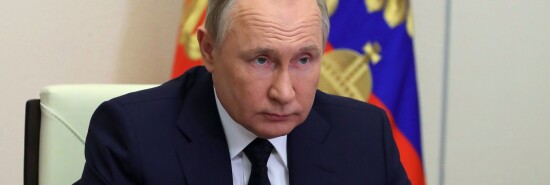
Russia’s free nations gather in Washington
Janusz Bugajski
A growing movement among Russia’s captive nations will be holding its first forum in Washington next week. Representatives from over a dozen republics and regions are demanding sovereignty and independence from the failing Russian Federation. They are making their case in America with an event at the Hudson Institute think tank.
The consequences of Russia’s failing war in Ukraine and of Moscow’s increasing isolation from Europe and the rest of the democratic world are clear. They provide a unique opportunity for building new states to ensure the dissolution of Europe’s last empire. Activists representing a diverse assortment of nations from Chechnya and Tatarstan to Siberia, Buryatia, and Sakha in the Russian far east believe that conditions for imperial collapse are ripening. Moscow’s enormous military losses and the country’s accelerating economic decline are revealing the incompetence of Russia’s ruling elite. Moscow is now widely perceived as the exploiting colonial metropolis that has failed to provide either security or welfare for its subjects.
SENATORS BRIEFED ON LEAK, STUNNED BY LACK OF CONTROLS OVER INTELLIGENCE
Ukraine’s military victory will also demonstrate that Russia’s claimed borders are transient. The loss of occupied Crimea and three Ukrainian regions annexed by Moscow will symbolically and practically demonstrate that Russia is losing territory. Other regions can also free themselves from Moscow’s control as regime capacities weaken in holding together the diverse and unwieldy Russian state.
It is crucial for independent voices beyond the narrow Moscow-centric liberal opposition to bring their message to America. As the Free Nations Forum expands, it will require offices in several capitals to accommodate representatives from numerous republics and regions. The local chapters will need to connect and advocate at all levels — with governments, legislatures, civil groups, diaspora organizations, business, media, religious organizations, and educational and cultural networks.
The key message to Western leaders is that encouraging regions and republics to cooperate in designing a “post-Russia” will help minimize the violent disintegration that many in the West fear. The regime in Moscow may promote violence, but the nations trapped inside Russia want to live in peace with each other. Preparations to recognize the independence of new states seeking freedom, democracy, self-determination, and international cooperation are fully in line with Western values and interests.
The Free Nations Forum should focus its message in Washington on the positive outcome of Russia’s rupture. A shrinking state under international sanctions with a collapsing budget and escalating internal pressures will have severely reduced capabilities to attack its neighbors. Its ability to entangle Europe in energy dependence, engage in political corruption, and spread disinformation will be curtailed. NATO’s eastern flank from the Arctic to the Black Sea will become more secure. Enhanced economic development, business investment, and regional cooperation will follow. Ukraine and Moldova can regain their occupied territories and petition for EU and NATO integration without fear of Russia’s reaction. Belarus can also secure its independence.
Above all, with open support from the West for pluralism, democracy, and regional sovereignty, Russia’s citizens will realize that they are not globally isolated. They will also need information that Moscow suppresses, particularly on the advantages of forming new states that cultivate peaceful and productive relations with all neighbors. The most effective way to prevent Moscow’s imperial resurgence is to recognize the independence of all republics and regions seeking statehood.
Emerging states can become new allies for Western and Eastern democracies. American leaders should not fear the collapse of a failed empire but embrace it as an opportunity to intensify multinational cooperation, open new markets, and help emerging democracies to develop.
CLICK HERE TO READ MORE FROM THE WASHINGTON EXAMINER
Janusz Bugajski is a senior fellow at the Jamestown Foundation in Washington, D.C. His new book is Failed State: A Guide to Russia’s Rupture.
